2024年中考英语人教版新目标一轮复习教材梳理课件:第3讲 七年级下 Units 1~4(共49张PPT)
文档属性
| 名称 | 2024年中考英语人教版新目标一轮复习教材梳理课件:第3讲 七年级下 Units 1~4(共49张PPT) |  | |
| 格式 | pptx | ||
| 文件大小 | 1.1MB | ||
| 资源类型 | 教案 | ||
| 版本资源 | 人教新目标(Go for it)版 | ||
| 科目 | 英语 | ||
| 更新时间 | 2024-01-11 20:38:32 | ||
图片预览

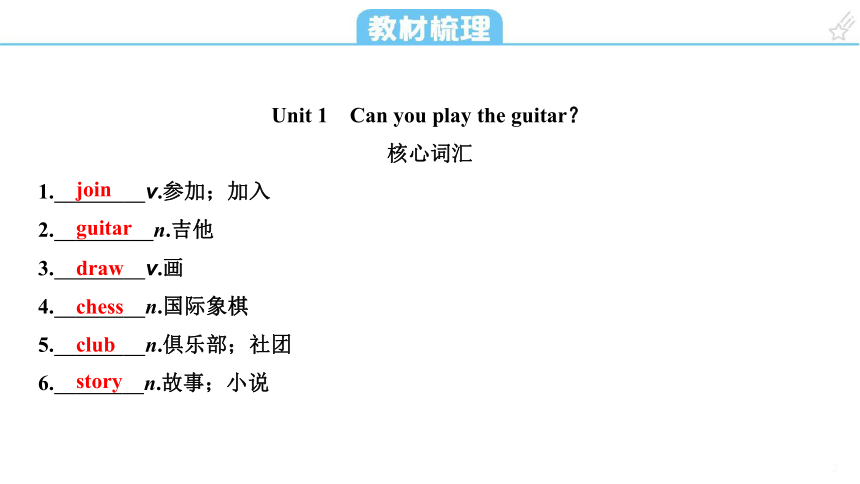
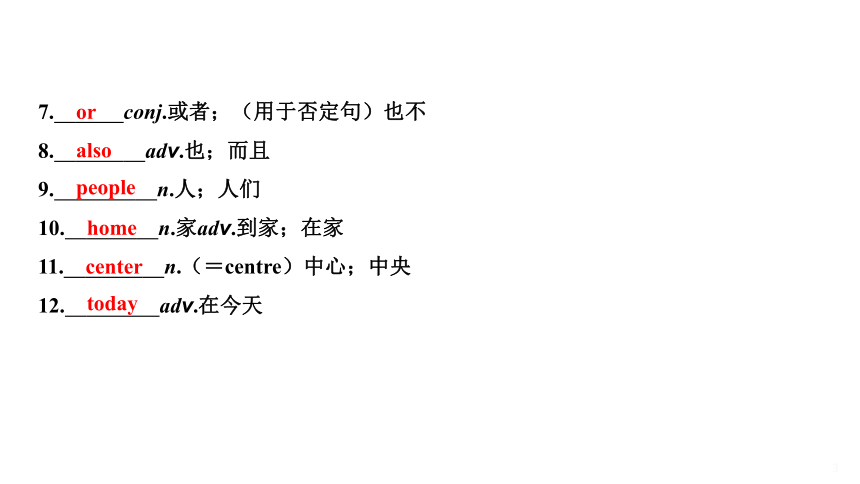
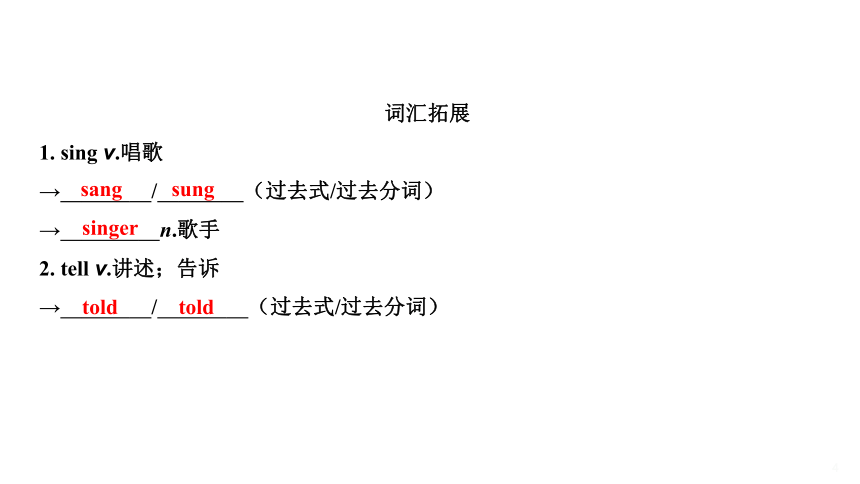
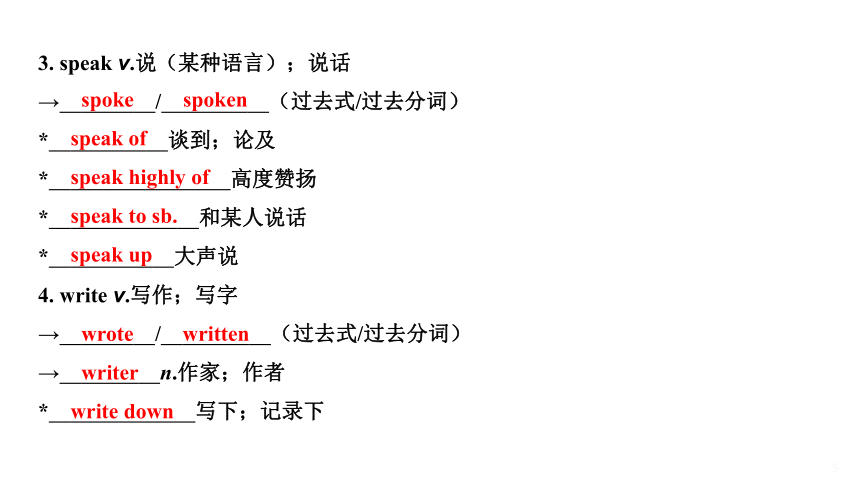
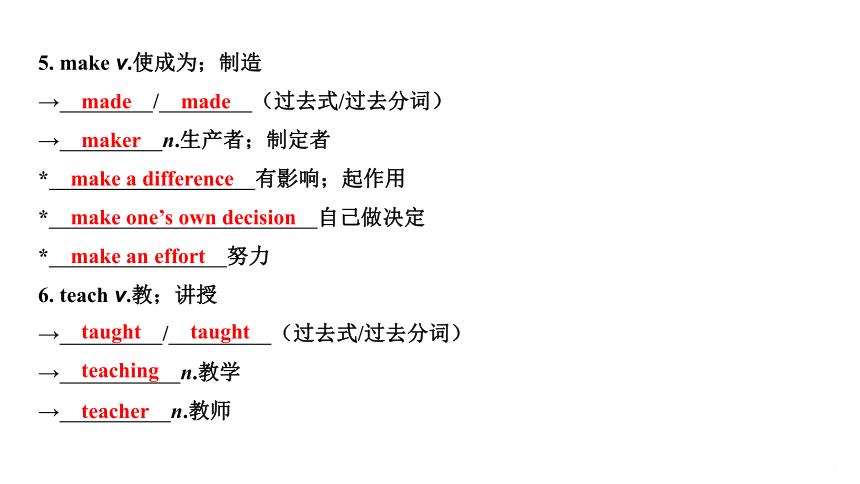
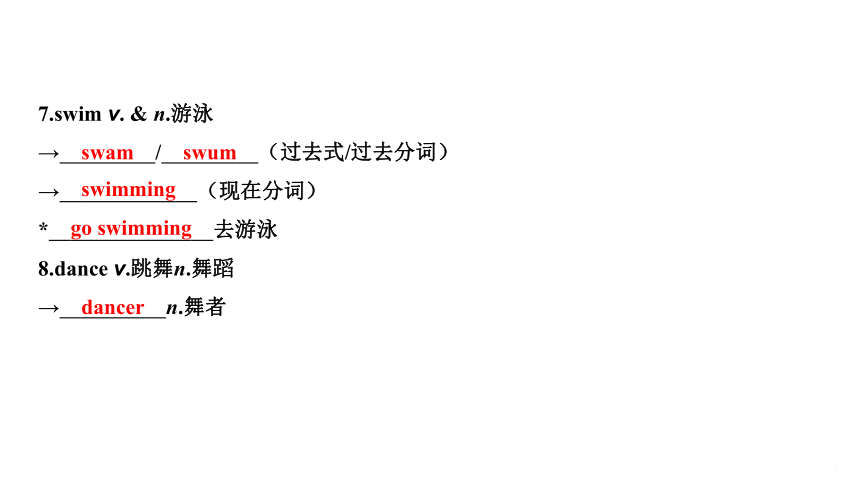
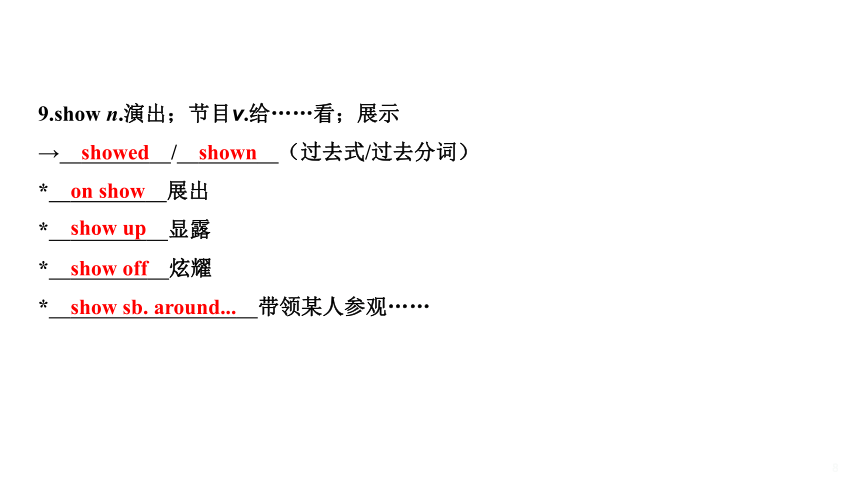
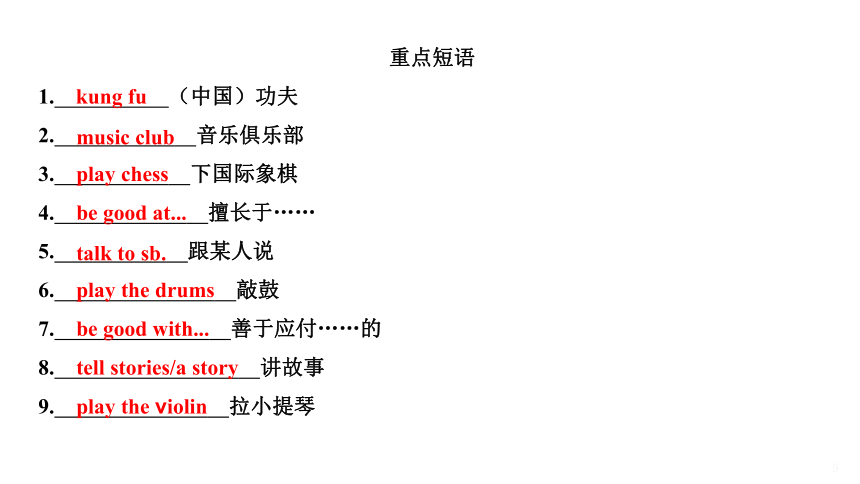
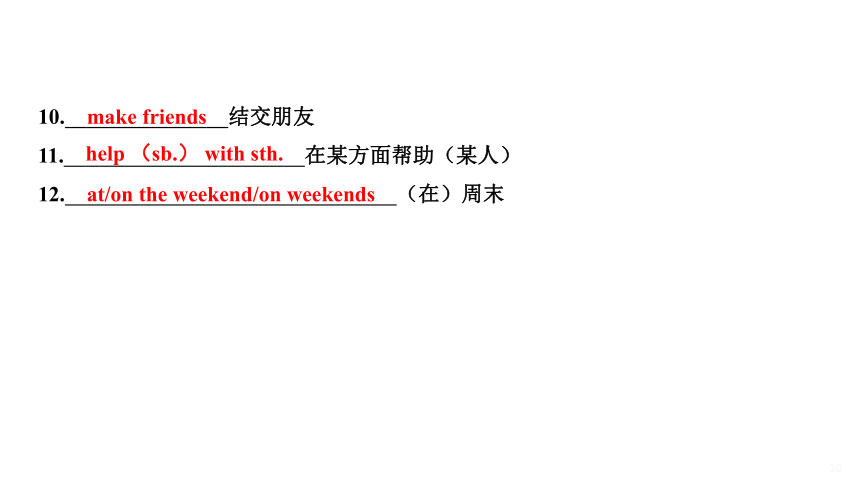
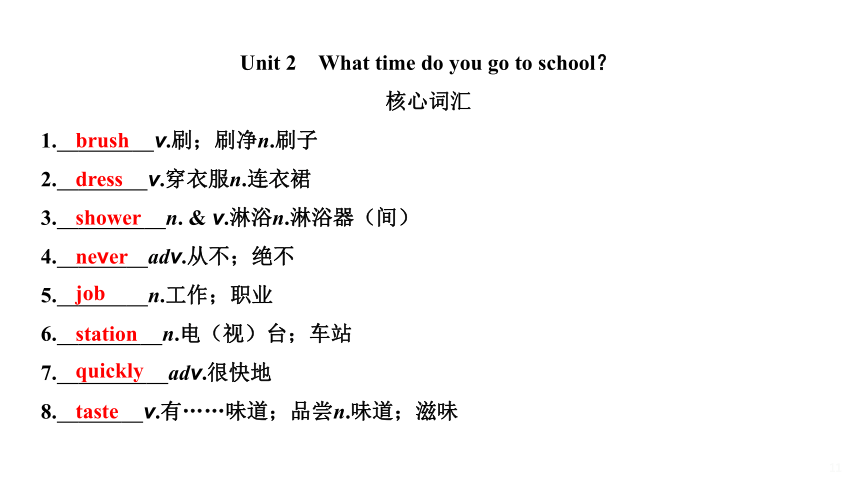
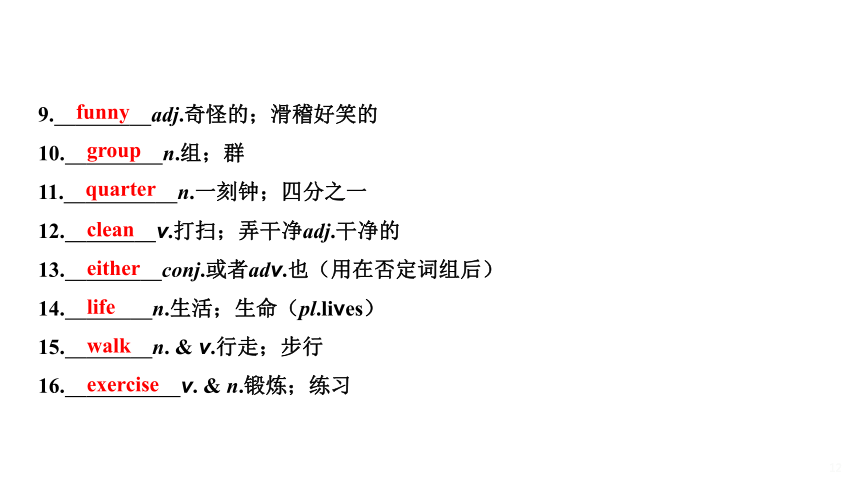
文档简介
(共49张PPT)
英语
七年级下
第3讲
七年级下 Units 1~4
Unit 1 Can you play the guitar?
核心词汇
1. draw v.参加;加入
2. guitar n.吉他
3. draw v.画
4. chess n.国际象棋
5. draw n.俱乐部;社团
6. story n.故事;小说
join
guitar
draw
chess
club
story
7. draw conj.或者;(用于否定句)也不
8. draw adv.也;而且
9. people n.人;人们
10. home n.家adv.到家;在家
11. center n.(=centre)中心;中央
12. today adv.在今天
or
also
people
home
center
today
词汇拓展
1. sing v.唱歌
→ draw / sung (过去式/过去分词)
→ singer n.歌手
2. tell v.讲述;告诉
→ draw / draw (过去式/过去分词)
sang
sung
singer
told
told
3. speak v.说(某种语言);说话
→ spoke / spoken (过去式/过去分词)
* speak of 谈到;论及
* speak highly of 高度赞扬
* speak to sb. 和某人说话
* speak up 大声说
4. write v.写作;写字
→ wrote / written (过去式/过去分词)
→ writer n.作家;作者
* write down 写下;记录下
spoke
spoken
speak of
speak highly of
speak to sb.
speak up
wrote
written
writer
write down
5. make v.使成为;制造
→ made / made (过去式/过去分词)
→ maker n.生产者;制定者
* make a difference 有影响;起作用
* make one’s own decision 自己做决定
* make an effort 努力
6. teach v.教;讲授
→ taught / taught (过去式/过去分词)
→ teaching n.教学
→ teacher n.教师
made
made
maker
make a difference
make one’s own decision
make an effort
taught
taught
teaching
teacher
7.swim v. & n.游泳
→ swam / swum (过去式/过去分词)
→ swimming (现在分词)
* go swimming 去游泳
8.dance v.跳舞n.舞蹈
→ dancer n.舞者
swam
swum
swimming
go swimming
dancer
9.show n.演出;节目v.给……看;展示
→ showed / shown (过去式/过去分词)
* on show 展出
* show up 显露
* show off 炫耀
* show sb. around... 带领某人参观……
showed
shown
on show
show up
show off
show sb. around...
重点短语
1. kung fu (中国)功夫
2. music club 音乐俱乐部
3. play chess 下国际象棋
4. be good at... 擅长于……
5. talk to sb. 跟某人说
6. play the drums 敲鼓
7. be good with... 善于应付……的
8. tell stories/a story 讲故事
9. play the violin 拉小提琴
kung fu
music club
play chess
be good at...
talk to sb.
play the drums
be good with...
tell stories/a story
play the violin
10. make friends 结交朋友
11. help (sb.) with sth. 在某方面帮助(某人)
12. at/on the weekend/on weekends (在)周末
make friends
help (sb.) with sth.
at/on the weekend/on weekends
Unit 2 What time do you go to school?
核心词汇
1. brush v.刷;刷净n.刷子
2. dress v.穿衣服n.连衣裙
3. shower n. & v.淋浴n.淋浴器(间)
4. draw adv.从不;绝不
5. draw n.工作;职业
6. station n.电(视)台;车站
7. quickly adv.很快地
8. taste v.有……味道;品尝n.味道;滋味
brush
dress
shower
never
job
station
quickly
taste
9. funny adj.奇怪的;滑稽好笑的
10. group n.组;群
11. quarter n.一刻钟;四分之一
12. clean v.打扫;弄干净adj.干净的
13. either conj.或者adv.也(用在否定词组后)
14. walk n.生活;生命(pl.lives)
15. walk n. & v.行走;步行
16. exercise v. & n.锻炼;练习
group
quarter
clean
either
life
walk
exercise
funny
词汇拓展
1.tooth n.牙齿
→ teeth (pl.)
→ toothache n.牙痛
2.usually adv.通常地;一般地
→ usual adj.通常的
→ unusual (反义词)adj.不同寻常的
* as usual 像往常一样
teeth
toothache
usual
unusual
as usual
3.run v.跑;奔
→ walk / walk (过去式/过去分词)
→ running (现在分词)
→ runner n.奔跑的人
* run away 逃跑
* run out (of) 用尽;耗尽
4.early adv. & adj.早(的)
→ earlier (比较级)
→ earliest (最高级)
→ walk adv. & adj. 迟(的)
ran
run
running
runner
run away
run out (of)
earlier
earliest
late
5.work v. & n.工作
→ worker n.工作者;工人
→ art works 艺术作品
* at work 在工作;上班
* work hard 努力工作;辛勤工作
* work out 算出;解决 ;成功地发展
* work as 担任;以……身份而工作
6.half n. & pron.一半;半数
→ work as (pl.)两等份
* in half 一半
7.past prep. 晚于;过(时间)adj.过去的
* in the past 在过去
worker
art works
at work
work hard
work out
work as
halves
in half
in the past
重点短语
1. radio station 广播电台
2. a funny time 一段愉快的时光
3. get dressed 穿上衣服
4. take a shower 洗淋浴
5. do (one’s) homework 做作业
6. take a walk 散步;走一走
7. brush teeth 刷牙
8. eat breakfast 吃早饭
9. get up 起床;站起来
10. either...or... 要么……要么……;或者……或者……
11. lots of (=a lot of) 大量;许多
radio station
a funny time
get dressed
take a shower
do (one’s) homework
take a walk
brush teeth
eat breakfast
get up
either...or...
lots of
Unit 3 How do you get to school?
核心词汇
1. work as n.车站;停止v.(使)停止
2. afraid adj.害怕;畏惧
3. train n.火车v.训练
4. subway n.地铁
5. hundred num.一百
6. minute n.分钟
7. work a adj.新的;刚出现的
8. cross v.横过;越过
stop
afraid
train
subway
hundred
minute
new
cross
9. work as n.河;江
10. work as n.村庄;村镇
11. between prep.介于……之间
12. bridge n.桥
13. work as n.小船v.划船
14. work as n.年;岁
river
village
between
bridge
boat
year
词汇拓展
1.drive v.开车
→ work as / work as (过去式/过去分词)
→ work as n.驾驶员;司机
* drive sb. crazy/mad 使人发疯/发狂
2.live v.居住;生活
→ work as adj.活着的;有生气的
→ work as adj.生机勃勃的;生动的
drove
driven
driver
drive sb. crazy/mad
alive
lively
3.leave v.离开;留下
→ work / work (过去式/过去分词)
* ask for leave 请假
* leave out 忽略;不提及;不考虑
* leave for... 动身去……
4.true adj.真的;符合事实的
→ truth n.实情;事实
→ truly adv.真正地;真实地;真诚地
* come true 实现;成为现实
* to tell the truth 老实说
left
left
ask for leave
leave out
leave for...
truth
truly
come true
to tell the truth
5.ride v.骑n.旅程
→ work a / ridden (过去式/过去分词)
* go for a ride 去兜风
6.far adv. & adj.远;远的
→ farther/further (比较级)
→ farthest/furthest (最高级)
7.dream n.梦想;睡梦 v.做梦
→ dreamed(dreamt) / dreamed(dreamt) (过去式/过去分词)
* realize one’s dream(=make one’s dream come true) 实现某人的梦想
* dream of/ about doing sth. 梦想(做)某事
rode
ridden
go for a ride
farther/further
farthest/furthest
dreamed(dreamt)
dreamed(dreamt)
realize one’s dream(=make one’s dream come true)
dream of/ about doing sth.
重点短语
1. bus stop 公共汽车站
2. train station 火车站
3. bus ride 公交车行程
4. ride a bike 骑自行车
5. think of 认为;想起
6. by bike 骑自行车
7. on a ropeway 在索道上
8. between...and... 在……和……之间
9. every day 每天
10. how far 多远(指距离)
11. how long 多久(指时间);多长(指物体)
bus stop
train station
bus ride
ride a bike
think of
by bike
on a ropeway
between...and...
every day
how far
how long
Unit 4 Don’t eat in class.
核心词汇
1. work as v.到达
2. work as n.大厅;礼堂
3. sorry adj.抱歉的;难过的;惋惜的
4. outside adv.在外面adj.外面的
5. wear v.穿;戴
6. bring v.带来;取来
7. quiet adj.安静的
8. work adv.外出
arrive
hall
sorry
outside
wear
bring
quiet
out
9. practice n. & v.练习
10. work a n.碟;盘
11. before prep. & conj.在……以前adv.以前
12. dirty adj.脏的
13. kitchen n.厨房
14. noisy adj.吵闹的
15. relax v.放松;休息
16. terrible adj.非常讨厌的;可怕的
17. strict adj.严格的;严厉的
18. remember v.记住;记起
19. work a n.头发;毛发
practice
dish
before
dirty
kitchen
noisy
relax
terrible
strict
remember
hair
词汇拓展
1.rule n.规则;规章
→ ruler n.统治者;尺;直尺
2.fight v.打架;战斗
→ fought / fought (过去式/过去分词)
* fight for 为……而战
* fight against 对抗;反对
ruler
fought
fought
fight for
fight against
3.read v.读;阅读
→ work a / work as (过去式/过去分词)
→ reading n.阅读;读物
→ reader n.读者;电子阅读器
4.feel v.感受;觉得
→ work / work a (过去式/过去分词)
→ feeling n. 感觉;感触
5.follow v.遵循;跟随
→ following adj.接着的; 接下来的
* follow the rules 遵守规则
read
read
reading
reader
felt
felt
feeling
following
follow the rules
6.luck n.幸运;运气
→ lucky adj.幸运的
→ luckily adv.幸运地;好运地
→ unlucky adj.不幸的;不吉利的
→ unluckily adv.不幸地
* good luck to you 祝你好运
* bring good luck to... 给……带来好运
7.important adj.重要的
→ unimportant (反义词)adj.不重要的
→ importance n.重要性;重要
lucky
luckily
unlucky
unluckily
good luck to you
bring good luck to...
unimportant
importance
8.keep v.保持;保留
→ work a / work as (过去式/过去分词)
→ keeper n.饲养员;保管人
* keep in mind 记住
* keep in touch with sb. 与某人保持联系
9.learn v.学习;学会
→ learned / learnt / learned / learnt (过去式/过去分词)
→ learner n.学习者
* learn from 从/向……学习
kept
kept
keeper
keep in mind
keep in touch with sb.
learned
learnt
learned
learnt
learner
learn from
重点短语
1. dining hall 餐厅
2. school uniform 校服
3. listen to 听
4. have to 必须;不得不
5. go out 外出(娱乐)
6. do the dishes 清洗餐具
7. make one’s bed 铺床
8. be strict with sb. 对某人要求严格
9. be late for 迟到
10. on time 准时
11. in class 课堂上
dining hall
school uniform
listen to
have to
go out
do the dishes
make one’s bed
be strict with sb.
be late for
on time
in class
draw的用法(Unit 1, P1)
一看全国视野(探考向)
(2023·湖北荆州改编)I’m a shy person. I love to write and draw (画画).
二理知识锦囊(累知识)
draw
三测多维评价(练用法)
根据括号中的汉语提示完成句子
1.The course draws (吸引) students from all over the country.
2.People usually draw (拉起) the curtains once it gets dark.
3.My eyes were drawn (吸引) to the man in the corner.
draws
draw
drawn
also、too、as well、either、neither的用法(Unit 1, P5)
一看全国视野(探考向)
either neither both all
1.I tried to buy the dictionary in two bookstores, but neither of them had it.
2.(2023·四川泸州改编)—There are two books about Chinese traditional tea-making culture.
—You’re free to take either of them and leave one for me.
neither
either
3.(2022·湖北武汉)—To go abroad or not to go after graduation, it’s a question.
—You may take either of the roads. But being home is the end matters.
either
二理知识锦囊(累知识)
also、too、as well、either与neither都有“也”的意思,但用法有区别,具体区别如下:
含义及用法
also 意为“也”,位于be动词、助动词、情态动词之后,行为动词之前 用于肯定句
too 意为“也”,位于句末,其前多用逗号隔开
as well 意为“也”,位于句末,其前不用逗号隔开
either 意为“也”,位于句末,其前用逗号隔开 用于否定句
neither 意为“也不”,常用于倒装句以及句子“Me neither.”中 表示否定
三测多维评价(练用法)
用方框中所给单词或短语的适当形式填空
too also either as well neither
1.Lucy doesn’t like playing games. I don’t like it, either . I think it’s a waste of time.
2.—What do you think of Gina?
—She is such a perfect girl. She is good at singing and can dance as well/too .
either
as well/too
3.I want to plant some trees in our community. Larry wants to do it with me, either .
4.—I haven’t finished my homework yet. How about you?
—Me neither . Let’s go to the library.
too
neither
5.My sister likes English. I either like English.
6.I don’t want to go shopping.He doesn’t want to, either .
also
either
good的用法(Unit 1, P2)
一看全国视野(探考向)
(2023·山东滨州改编)毫无疑问,中国擅长修建桥梁和铁路。
Without doubt, China is good at/does well in building bridges and railways.
is good at/does well in
二理知识锦囊(累知识)
三测多维评价(练用法)
用介词at、to、with或for填空
1.Music is good either our life. Miss Zhao is good either music. She is always good either children in the music club, so they are good either each other.
2.—Gina, what is your favorite subject?
—I like English best, because I am good eithe it.
for
at
with
to
at
3.—Driving less and walking more is good eithe our health.
—I agree with you. It also helps protect the environment.
for
交通方式的用法(Unit 3, P13)
一看全国视野(探考向)
on by
1.(2021·吉林改编)Mr.Smith has his driver’s licence,but he always goes to work eithe foot.
2.(2023·四川自贡改编)—I want to know how you got to Zigong yesterday.
— eithe high-speed train.
on
By
二理知识锦囊(累知识)
(1)询问交通方式的常用句型:How do/does+sb.+go/get (to)...?意为“某人如何去……?”
(2)其常用回答:
三测多维评价(练用法)
一、用by、 in、 on、 take填空
1.Tom’s mother usually goes to work eithe foot.
2.We went to the zoo eithe a car last Sunday.
3.Jack plans to eithe the plane to travel next month.
4.My father goes to work eithe subway every day.
5.My mother often goes to work eithe bus.
on
in
take
by
by
二、根据汉语提示完成句子
1.我们学校离我们家不远。因此我们可以一起骑自行车去上学。
Our school is not far from our home, so we can go to school eithe eithe together.
2.我经常乘坐公共汽车去学校,但是今天我步行去学校。
I usually eithe a/the eithe to school, but I went to school on foot today.
by
bike
take
a/the
bus
how far、 how often、 how soon、 how long的用法(Unit 3, P15)
一看全国视野(探考向)
how far how often how long
1.(2023·福建改编)— How far is it from our home to the museum, Dad?
—It’s about two kilometers.
2.(2023·江苏连云港改编)— How long have you been a member of the Youth League?
—For three years.
3.(2023·四川自贡改编)— How often do you help at the old people’s home?
—Once a week. We should care about the old more.
How far
How long
How often
二理知识锦囊(累知识)
how far、how often、how soon、how long的用法如下:
三测多维评价(练用法)
在横线上填上适当的疑问词
1.— How often do you have an English party?
—Once a month.
2.— How long will it take us to get there by bus?
—About two hours.
3.— How far is it from your home to Dalian?
—About 200 kilometers.
4.— How long can I keep this book?
—For four weeks.
How often
How long
How far
How long
5.— How soon will he be back?
—In a week.
6.— How often does your sister exercise?
—Every day.
7.— How often does your sister play the piano?
—Four times a week.
8.— How long is the desk?
—2 meters.
How soon
How often
How often
How long
remember的用法(Unit 4,P23)
一看全国视野(探考向)
(2023·安徽改编)From my childhood, I clearly remember (记得)my parents working hard day and night.
remember
二理知识锦囊(累知识)
类似用法的单词有forget、regret 等。这类动词后跟to do表示行为还没有发生,强调的是将要发生;后跟动名词,表示行为已经发生了。
三测多维评价(练用法)
用括号内所给词的适当形式填空
1.Daniel, remember to stand (stand) up every 30 minutes when you are reading or writing and let your eyes have a rest.
2.The boy forgot to hand (hand) in his homework, so his teacher was angry.
3.I remembered returning (return) the book to the library last week.
4.I remember putting (put) the wallet in my handbag, but I can’t find it anywhere now.
5.How I regret making (make) such a silly decision! I must face the awful result now.
to stand
to hand
returning
putting
making
英语
七年级下
第3讲
七年级下 Units 1~4
Unit 1 Can you play the guitar?
核心词汇
1. draw v.参加;加入
2. guitar n.吉他
3. draw v.画
4. chess n.国际象棋
5. draw n.俱乐部;社团
6. story n.故事;小说
join
guitar
draw
chess
club
story
7. draw conj.或者;(用于否定句)也不
8. draw adv.也;而且
9. people n.人;人们
10. home n.家adv.到家;在家
11. center n.(=centre)中心;中央
12. today adv.在今天
or
also
people
home
center
today
词汇拓展
1. sing v.唱歌
→ draw / sung (过去式/过去分词)
→ singer n.歌手
2. tell v.讲述;告诉
→ draw / draw (过去式/过去分词)
sang
sung
singer
told
told
3. speak v.说(某种语言);说话
→ spoke / spoken (过去式/过去分词)
* speak of 谈到;论及
* speak highly of 高度赞扬
* speak to sb. 和某人说话
* speak up 大声说
4. write v.写作;写字
→ wrote / written (过去式/过去分词)
→ writer n.作家;作者
* write down 写下;记录下
spoke
spoken
speak of
speak highly of
speak to sb.
speak up
wrote
written
writer
write down
5. make v.使成为;制造
→ made / made (过去式/过去分词)
→ maker n.生产者;制定者
* make a difference 有影响;起作用
* make one’s own decision 自己做决定
* make an effort 努力
6. teach v.教;讲授
→ taught / taught (过去式/过去分词)
→ teaching n.教学
→ teacher n.教师
made
made
maker
make a difference
make one’s own decision
make an effort
taught
taught
teaching
teacher
7.swim v. & n.游泳
→ swam / swum (过去式/过去分词)
→ swimming (现在分词)
* go swimming 去游泳
8.dance v.跳舞n.舞蹈
→ dancer n.舞者
swam
swum
swimming
go swimming
dancer
9.show n.演出;节目v.给……看;展示
→ showed / shown (过去式/过去分词)
* on show 展出
* show up 显露
* show off 炫耀
* show sb. around... 带领某人参观……
showed
shown
on show
show up
show off
show sb. around...
重点短语
1. kung fu (中国)功夫
2. music club 音乐俱乐部
3. play chess 下国际象棋
4. be good at... 擅长于……
5. talk to sb. 跟某人说
6. play the drums 敲鼓
7. be good with... 善于应付……的
8. tell stories/a story 讲故事
9. play the violin 拉小提琴
kung fu
music club
play chess
be good at...
talk to sb.
play the drums
be good with...
tell stories/a story
play the violin
10. make friends 结交朋友
11. help (sb.) with sth. 在某方面帮助(某人)
12. at/on the weekend/on weekends (在)周末
make friends
help (sb.) with sth.
at/on the weekend/on weekends
Unit 2 What time do you go to school?
核心词汇
1. brush v.刷;刷净n.刷子
2. dress v.穿衣服n.连衣裙
3. shower n. & v.淋浴n.淋浴器(间)
4. draw adv.从不;绝不
5. draw n.工作;职业
6. station n.电(视)台;车站
7. quickly adv.很快地
8. taste v.有……味道;品尝n.味道;滋味
brush
dress
shower
never
job
station
quickly
taste
9. funny adj.奇怪的;滑稽好笑的
10. group n.组;群
11. quarter n.一刻钟;四分之一
12. clean v.打扫;弄干净adj.干净的
13. either conj.或者adv.也(用在否定词组后)
14. walk n.生活;生命(pl.lives)
15. walk n. & v.行走;步行
16. exercise v. & n.锻炼;练习
group
quarter
clean
either
life
walk
exercise
funny
词汇拓展
1.tooth n.牙齿
→ teeth (pl.)
→ toothache n.牙痛
2.usually adv.通常地;一般地
→ usual adj.通常的
→ unusual (反义词)adj.不同寻常的
* as usual 像往常一样
teeth
toothache
usual
unusual
as usual
3.run v.跑;奔
→ walk / walk (过去式/过去分词)
→ running (现在分词)
→ runner n.奔跑的人
* run away 逃跑
* run out (of) 用尽;耗尽
4.early adv. & adj.早(的)
→ earlier (比较级)
→ earliest (最高级)
→ walk adv. & adj. 迟(的)
ran
run
running
runner
run away
run out (of)
earlier
earliest
late
5.work v. & n.工作
→ worker n.工作者;工人
→ art works 艺术作品
* at work 在工作;上班
* work hard 努力工作;辛勤工作
* work out 算出;解决 ;成功地发展
* work as 担任;以……身份而工作
6.half n. & pron.一半;半数
→ work as (pl.)两等份
* in half 一半
7.past prep. 晚于;过(时间)adj.过去的
* in the past 在过去
worker
art works
at work
work hard
work out
work as
halves
in half
in the past
重点短语
1. radio station 广播电台
2. a funny time 一段愉快的时光
3. get dressed 穿上衣服
4. take a shower 洗淋浴
5. do (one’s) homework 做作业
6. take a walk 散步;走一走
7. brush teeth 刷牙
8. eat breakfast 吃早饭
9. get up 起床;站起来
10. either...or... 要么……要么……;或者……或者……
11. lots of (=a lot of) 大量;许多
radio station
a funny time
get dressed
take a shower
do (one’s) homework
take a walk
brush teeth
eat breakfast
get up
either...or...
lots of
Unit 3 How do you get to school?
核心词汇
1. work as n.车站;停止v.(使)停止
2. afraid adj.害怕;畏惧
3. train n.火车v.训练
4. subway n.地铁
5. hundred num.一百
6. minute n.分钟
7. work a adj.新的;刚出现的
8. cross v.横过;越过
stop
afraid
train
subway
hundred
minute
new
cross
9. work as n.河;江
10. work as n.村庄;村镇
11. between prep.介于……之间
12. bridge n.桥
13. work as n.小船v.划船
14. work as n.年;岁
river
village
between
bridge
boat
year
词汇拓展
1.drive v.开车
→ work as / work as (过去式/过去分词)
→ work as n.驾驶员;司机
* drive sb. crazy/mad 使人发疯/发狂
2.live v.居住;生活
→ work as adj.活着的;有生气的
→ work as adj.生机勃勃的;生动的
drove
driven
driver
drive sb. crazy/mad
alive
lively
3.leave v.离开;留下
→ work / work (过去式/过去分词)
* ask for leave 请假
* leave out 忽略;不提及;不考虑
* leave for... 动身去……
4.true adj.真的;符合事实的
→ truth n.实情;事实
→ truly adv.真正地;真实地;真诚地
* come true 实现;成为现实
* to tell the truth 老实说
left
left
ask for leave
leave out
leave for...
truth
truly
come true
to tell the truth
5.ride v.骑n.旅程
→ work a / ridden (过去式/过去分词)
* go for a ride 去兜风
6.far adv. & adj.远;远的
→ farther/further (比较级)
→ farthest/furthest (最高级)
7.dream n.梦想;睡梦 v.做梦
→ dreamed(dreamt) / dreamed(dreamt) (过去式/过去分词)
* realize one’s dream(=make one’s dream come true) 实现某人的梦想
* dream of/ about doing sth. 梦想(做)某事
rode
ridden
go for a ride
farther/further
farthest/furthest
dreamed(dreamt)
dreamed(dreamt)
realize one’s dream(=make one’s dream come true)
dream of/ about doing sth.
重点短语
1. bus stop 公共汽车站
2. train station 火车站
3. bus ride 公交车行程
4. ride a bike 骑自行车
5. think of 认为;想起
6. by bike 骑自行车
7. on a ropeway 在索道上
8. between...and... 在……和……之间
9. every day 每天
10. how far 多远(指距离)
11. how long 多久(指时间);多长(指物体)
bus stop
train station
bus ride
ride a bike
think of
by bike
on a ropeway
between...and...
every day
how far
how long
Unit 4 Don’t eat in class.
核心词汇
1. work as v.到达
2. work as n.大厅;礼堂
3. sorry adj.抱歉的;难过的;惋惜的
4. outside adv.在外面adj.外面的
5. wear v.穿;戴
6. bring v.带来;取来
7. quiet adj.安静的
8. work adv.外出
arrive
hall
sorry
outside
wear
bring
quiet
out
9. practice n. & v.练习
10. work a n.碟;盘
11. before prep. & conj.在……以前adv.以前
12. dirty adj.脏的
13. kitchen n.厨房
14. noisy adj.吵闹的
15. relax v.放松;休息
16. terrible adj.非常讨厌的;可怕的
17. strict adj.严格的;严厉的
18. remember v.记住;记起
19. work a n.头发;毛发
practice
dish
before
dirty
kitchen
noisy
relax
terrible
strict
remember
hair
词汇拓展
1.rule n.规则;规章
→ ruler n.统治者;尺;直尺
2.fight v.打架;战斗
→ fought / fought (过去式/过去分词)
* fight for 为……而战
* fight against 对抗;反对
ruler
fought
fought
fight for
fight against
3.read v.读;阅读
→ work a / work as (过去式/过去分词)
→ reading n.阅读;读物
→ reader n.读者;电子阅读器
4.feel v.感受;觉得
→ work / work a (过去式/过去分词)
→ feeling n. 感觉;感触
5.follow v.遵循;跟随
→ following adj.接着的; 接下来的
* follow the rules 遵守规则
read
read
reading
reader
felt
felt
feeling
following
follow the rules
6.luck n.幸运;运气
→ lucky adj.幸运的
→ luckily adv.幸运地;好运地
→ unlucky adj.不幸的;不吉利的
→ unluckily adv.不幸地
* good luck to you 祝你好运
* bring good luck to... 给……带来好运
7.important adj.重要的
→ unimportant (反义词)adj.不重要的
→ importance n.重要性;重要
lucky
luckily
unlucky
unluckily
good luck to you
bring good luck to...
unimportant
importance
8.keep v.保持;保留
→ work a / work as (过去式/过去分词)
→ keeper n.饲养员;保管人
* keep in mind 记住
* keep in touch with sb. 与某人保持联系
9.learn v.学习;学会
→ learned / learnt / learned / learnt (过去式/过去分词)
→ learner n.学习者
* learn from 从/向……学习
kept
kept
keeper
keep in mind
keep in touch with sb.
learned
learnt
learned
learnt
learner
learn from
重点短语
1. dining hall 餐厅
2. school uniform 校服
3. listen to 听
4. have to 必须;不得不
5. go out 外出(娱乐)
6. do the dishes 清洗餐具
7. make one’s bed 铺床
8. be strict with sb. 对某人要求严格
9. be late for 迟到
10. on time 准时
11. in class 课堂上
dining hall
school uniform
listen to
have to
go out
do the dishes
make one’s bed
be strict with sb.
be late for
on time
in class
draw的用法(Unit 1, P1)
一看全国视野(探考向)
(2023·湖北荆州改编)I’m a shy person. I love to write and draw (画画).
二理知识锦囊(累知识)
draw
三测多维评价(练用法)
根据括号中的汉语提示完成句子
1.The course draws (吸引) students from all over the country.
2.People usually draw (拉起) the curtains once it gets dark.
3.My eyes were drawn (吸引) to the man in the corner.
draws
draw
drawn
also、too、as well、either、neither的用法(Unit 1, P5)
一看全国视野(探考向)
either neither both all
1.I tried to buy the dictionary in two bookstores, but neither of them had it.
2.(2023·四川泸州改编)—There are two books about Chinese traditional tea-making culture.
—You’re free to take either of them and leave one for me.
neither
either
3.(2022·湖北武汉)—To go abroad or not to go after graduation, it’s a question.
—You may take either of the roads. But being home is the end matters.
either
二理知识锦囊(累知识)
also、too、as well、either与neither都有“也”的意思,但用法有区别,具体区别如下:
含义及用法
also 意为“也”,位于be动词、助动词、情态动词之后,行为动词之前 用于肯定句
too 意为“也”,位于句末,其前多用逗号隔开
as well 意为“也”,位于句末,其前不用逗号隔开
either 意为“也”,位于句末,其前用逗号隔开 用于否定句
neither 意为“也不”,常用于倒装句以及句子“Me neither.”中 表示否定
三测多维评价(练用法)
用方框中所给单词或短语的适当形式填空
too also either as well neither
1.Lucy doesn’t like playing games. I don’t like it, either . I think it’s a waste of time.
2.—What do you think of Gina?
—She is such a perfect girl. She is good at singing and can dance as well/too .
either
as well/too
3.I want to plant some trees in our community. Larry wants to do it with me, either .
4.—I haven’t finished my homework yet. How about you?
—Me neither . Let’s go to the library.
too
neither
5.My sister likes English. I either like English.
6.I don’t want to go shopping.He doesn’t want to, either .
also
either
good的用法(Unit 1, P2)
一看全国视野(探考向)
(2023·山东滨州改编)毫无疑问,中国擅长修建桥梁和铁路。
Without doubt, China is good at/does well in building bridges and railways.
is good at/does well in
二理知识锦囊(累知识)
三测多维评价(练用法)
用介词at、to、with或for填空
1.Music is good either our life. Miss Zhao is good either music. She is always good either children in the music club, so they are good either each other.
2.—Gina, what is your favorite subject?
—I like English best, because I am good eithe it.
for
at
with
to
at
3.—Driving less and walking more is good eithe our health.
—I agree with you. It also helps protect the environment.
for
交通方式的用法(Unit 3, P13)
一看全国视野(探考向)
on by
1.(2021·吉林改编)Mr.Smith has his driver’s licence,but he always goes to work eithe foot.
2.(2023·四川自贡改编)—I want to know how you got to Zigong yesterday.
— eithe high-speed train.
on
By
二理知识锦囊(累知识)
(1)询问交通方式的常用句型:How do/does+sb.+go/get (to)...?意为“某人如何去……?”
(2)其常用回答:
三测多维评价(练用法)
一、用by、 in、 on、 take填空
1.Tom’s mother usually goes to work eithe foot.
2.We went to the zoo eithe a car last Sunday.
3.Jack plans to eithe the plane to travel next month.
4.My father goes to work eithe subway every day.
5.My mother often goes to work eithe bus.
on
in
take
by
by
二、根据汉语提示完成句子
1.我们学校离我们家不远。因此我们可以一起骑自行车去上学。
Our school is not far from our home, so we can go to school eithe eithe together.
2.我经常乘坐公共汽车去学校,但是今天我步行去学校。
I usually eithe a/the eithe to school, but I went to school on foot today.
by
bike
take
a/the
bus
how far、 how often、 how soon、 how long的用法(Unit 3, P15)
一看全国视野(探考向)
how far how often how long
1.(2023·福建改编)— How far is it from our home to the museum, Dad?
—It’s about two kilometers.
2.(2023·江苏连云港改编)— How long have you been a member of the Youth League?
—For three years.
3.(2023·四川自贡改编)— How often do you help at the old people’s home?
—Once a week. We should care about the old more.
How far
How long
How often
二理知识锦囊(累知识)
how far、how often、how soon、how long的用法如下:
三测多维评价(练用法)
在横线上填上适当的疑问词
1.— How often do you have an English party?
—Once a month.
2.— How long will it take us to get there by bus?
—About two hours.
3.— How far is it from your home to Dalian?
—About 200 kilometers.
4.— How long can I keep this book?
—For four weeks.
How often
How long
How far
How long
5.— How soon will he be back?
—In a week.
6.— How often does your sister exercise?
—Every day.
7.— How often does your sister play the piano?
—Four times a week.
8.— How long is the desk?
—2 meters.
How soon
How often
How often
How long
remember的用法(Unit 4,P23)
一看全国视野(探考向)
(2023·安徽改编)From my childhood, I clearly remember (记得)my parents working hard day and night.
remember
二理知识锦囊(累知识)
类似用法的单词有forget、regret 等。这类动词后跟to do表示行为还没有发生,强调的是将要发生;后跟动名词,表示行为已经发生了。
三测多维评价(练用法)
用括号内所给词的适当形式填空
1.Daniel, remember to stand (stand) up every 30 minutes when you are reading or writing and let your eyes have a rest.
2.The boy forgot to hand (hand) in his homework, so his teacher was angry.
3.I remembered returning (return) the book to the library last week.
4.I remember putting (put) the wallet in my handbag, but I can’t find it anywhere now.
5.How I regret making (make) such a silly decision! I must face the awful result now.
to stand
to hand
returning
putting
making
